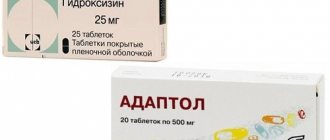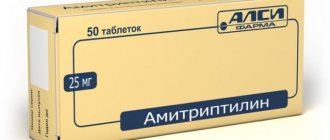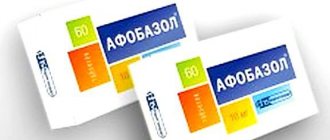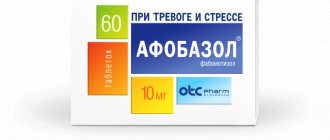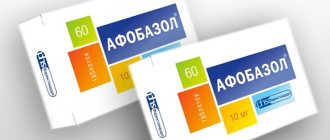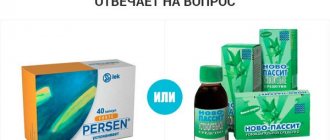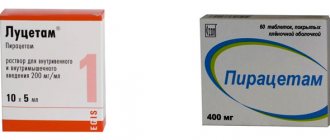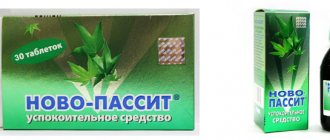Update date: 09/17/2020 15:31:12 4978 Share:
Author: Maria Feldshtein
In modern medicine, neuroses and the consequences of stress are treated not only with psychotherapy. Medications that can relieve anxiety and fear, improve mood, normalize sleep and return a person to normal life come to the rescue. These are drugs from the group of anxiolytics, and today we will compare two such drugs - Adaptol and Afobazol. What is the difference between them, read the article.
| The drug and its characteristics | Adaptol | Afobazole |
| Pharmacological group | Anxiolytic | Anxiolytic |
| Active substance | Tetramethyltetraazabicyclooctanedione | Fabomotizol |
| Release form | Pills | Pills |
| Manufacturer | OlainFarm (Latvia) | OTCPharm (Russia) |
| Price | 600-700 rub. | 250-350 rub. |
| Vacation at the pharmacy | On prescription | Over the counter |
Indications for prescribing anxiolytics
According to the official instructions, the drugs Adaptol and Afobazol are prescribed for the treatment of anxiety conditions and neuroses accompanied by irritability, anxiety and fear. These anxiolytics are used only in adult practice. For children under 18 years of age with similar symptoms, other remedies are recommended.
For other indications, anxiolytics differ.
Adaptol is recommended in the following situations:
- cardialgia (pain in the heart) not associated with ischemic heart disease and other organic causes;
- nicotine addiction – in complex therapy as a means of reducing cravings for tobacco;
- when taking antipsychotics and tranquilizers - to improve their tolerability.
Afobazole is prescribed for the following conditions:
- in complex therapy of various somatic diseases - for example, bronchial asthma, irritable bowel syndrome, arrhythmia;
- dermatological and oncological diseases;
- premenstrual syndrome;
- alcohol withdrawal;
- cardiopsychoneurosis.
Indications for therapy are determined by the doctor after examining the patient.
How are the drugs similar?
The medications under consideration are non-structural analogues, that is, they are similar in their principle of action. They also have the following common features:
- Help with nervous conditions, stress and other problems caused by nervous system disorders.
- Do not provoke addiction.
- Do not reduce physical activity.
- Improves the effects of sleeping pills.
In addition, they have similar contraindications and adverse reactions. Both products are not suitable for minor children. If necessary, they can be replaced with each other, but only after consulting a doctor .
How do anti-anxiety medications work?
In the medical literature, anxiolytics are also known as tranquilizers. By influencing the central nervous system, they relieve or reduce the severity of anxiety, restlessness, fear and emotional stress.
The mechanism of action of anxiolytics has not been fully elucidated. It is assumed that they reduce the excitability of the subcortical centers of the brain (hypothalamus, thalamus and limbic system). At the cellular level, the effect of different drugs is different, and we will talk about this in more detail.
Adaptol
The drug works through the emotiogenic zones of the hypothalamus. The chemical composition of Adaptol is similar to the body's natural metabolites - its molecule consists of two urea fragments. Once in the body, it affects all major neurotransmitter systems: GABA-, choline-, serotonin- and adrenergic. The drug harmonizes their work and thereby reduces anxiety, worry and fear, and eliminates internal tension.
What you need to know:
- The calming effect of Adaptol is not accompanied by side reactions characteristic of other similar drugs, such as muscle weakness and impaired coordination of movements.
- It does not reduce mental and motor activity, so it can be prescribed during the day.
- Does not cause drowsiness, but enhances the effect of sleeping pills.
- Improves mood, but does not lead to euphoria.
- It has a nootropic effect: improves attention and memory, stimulates mental performance.
Afobazole
Afobazole binds to sigma-1 receptors in brain cells, stabilizes the functioning of GABA receptors and restores their sensitivity to mediators - special substances that trigger inhibition processes in the nervous system. It also acts as a neuroprotector: it reduces the permeability of nerve cell membranes, increases their stability and accelerates recovery.
Afobazole works both as an anti-anxiety and a stimulant drug. It reduces or completely eliminates anxiety, relieves emotional tension and irritability, and normalizes sleep. The drug also removes somatic manifestations of anxiety (rapid heartbeat, upset bowel movements, muscle weakness, feeling of shortness of breath, etc.). At the same time, it improves attention and memory.
The effect of the drug is observed after 5-7 days from the start of therapy, reaches a maximum in the 4th week and persists after completion of the course for two weeks.
According to the instructions, Afobazole is most effective in people with asthenic character traits, prone to suspiciousness and anxiety, and emotional lability.
Characteristics of Adaptol
This medication is a selective non-benzodiazepine tranquilizer.
Pharmacological properties:
- anxiolytic;
- nootropic;
- vegetostabilizing;
- anticonvulsants;
- antioxidant;
- antihypoxic;
- analgesic;
- stress-protective.
It affects the activity of the structures of the limbic system, the reticular formation, and some neurotransmitter complexes, eliminating psychosomatic abnormalities. As a result, emotional excitability, irritability, nervousness decrease, falling asleep improves, sleep quality and performance increase, and a depressive mood is eliminated.
The medicine can have a metabolic effect, normalizing metabolic reactions disturbed by stress factors. Strengthens the effect of sleeping pills.
Advantages of Adaptol:
- Does not disrupt normal daily activity, does not cause lethargy, apathy, muscle weakness and desynchronization of movements.
- A pronounced anxiolytic effect is observed after the first dose.
- With repeated administration, it does not accumulate in tissues and is not addictive. There is also no withdrawal syndrome.
- Well tolerated. Does not provoke the development of behavioral disorders.
- Can be taken over a long course.
- Compatible with other psychotropic drugs, including tranquilizers.
The medication is administered orally. It is well absorbed from the gastrointestinal tract, the maximum plasma content is determined 30 minutes after administration and persists for the next 3-4 hours. Communication with blood proteins up to 40%. The drug actively overcomes the unchanged blood-brain barrier. It does not undergo biotransformation in the body. The half-life averages 8 hours. Excretion is carried out by the kidneys.
Adaptol does not disrupt the usual daily activity, does not cause lethargy, apathy, or muscle weakness.
Possible uses of Adaptol:
- neuroses, neurotic disorders;
- abstinence for alcohol and nicotine addictions;
- emotional instability, irritability, affective states, increased mood lability;
- auditory hallucinations;
- mild manic states, anxiety, phobias, including schizophrenia;
- residual effects after acute psychosis;
- pericardial pain not associated with ischemia;
- poisoning with neuroleptics and antipsychotics, elimination of neurological and somatovegetative symptoms caused by their use, treatment of dependence on sleeping pills and psychotropic drugs;
- psycho-emotional deviations during menopause;
- depressive states with eczematous-psoriatic lesions, etc.
The drug is contraindicated in case of hypersensitivity and at the beginning of pregnancy. May cause dizziness, asthenia, digestive disorders, allergic reactions. Sometimes there is a moderate decrease in body temperature and blood pressure. These indicators most often recover on their own, but require regular monitoring, especially at the beginning of treatment.
During treatment, caution should be exercised when performing activities that require increased alertness, including driving.
Assessing the effectiveness of drugs
The effectiveness of drugs is determined based on the results of clinical studies and practical experience of use.
Adaptol
From the perspective of evidence-based medicine, Adaptol remains a controversial drug. The Cochrane Library contains studies confirming the effectiveness and safety of anxiolytics. There are several articles on the drug in the medical database PubMed, but none of them contain information about large placebo-controlled studies. One of them indicated that Adaptol is effective in asthenoneurotic syndrome against the background of muscular dystonia, but the sample of patients was small, and we cannot rely on these data.
In Russian-language literature, Adaptol is treated differently. Review articles indicate that the drug is used for. Clinical trials have shown that in the second week of therapy, patients’ anxiety decreases and concomitant autonomic disorders go away. Adaptol is also used in some other areas of medicine.
Afobazole
Afobazol, like Adaptol, does not have a serious evidence base. There is no mention in PubMed or the Cochrane Library that placebo-controlled studies have been conducted for the drug. And only in Russian-language literature can you find information about the drug:
Afobazole for neuroses associated with anxiety. A clinical study showed that the effect of the drug develops slowly, with improvement observed by the end of the 4th week of treatment. There are practically no side reactions.
Afobazole itself and for generalized anxiety disorders. The review article shows that long-term use does not reduce the effectiveness of the drug and does not increase the risk of adverse reactions.
Which is better: Adaptol or Afobazol?
It is impossible to say unequivocally that any of the medications under consideration is better. Afobazole acts more gently, positive changes are detected gradually. Therefore, it is better to use it for prolonged neuroses and prolonged depression. For acute conditions and with negative consequences of taking psychotropic medications, you need to use Adaptol. In addition, it can be used to treat children, adolescents and pregnant women (from the 2nd trimester).
For hyperhidrosis
As clinical studies have shown, Afobazol and Adaptol effectively eliminate autonomic disorders, including local sweating, if it is caused by corresponding neuropsychiatric abnormalities. The products are used as part of a therapeutic complex.
Application diagram
The treatment regimen for the drugs is similar:
- Adaptol is prescribed three times a day. The maximum single dosage is 3 g, daily dosage is 10 g. The drug should be taken orally regardless of food intake. The duration of therapy ranges from several days to three months and depends on the clinical picture.
- Afobazole is prescribed three times a day. The maximum daily dosage is 30 mg. The course of therapy is 2-4 weeks. If necessary, you can increase the duration of treatment to three months.
Comparison of Adaptol and Afobazol
These tools have a lot in common. A comparative description of their features will help you decide between them.
Similarities
Both drugs were developed by domestic pharmacists and belong to the non-benzodiazepine anxiolytics. They restore circadian rhythms, normalize behavioral reactions, and regulate mood. Relieves various manifestations of anxiety:
- feeling of fear;
- nervousness;
- causeless agitation;
- tearfulness;
- fussiness;
- irritability;
- hyperactivity;
- tremor;
- unconscious movements of hands and fingers, nail biting;
- anxious thoughts;
- absent-mindedness;
- migraine, dorsalgia developing as a result of muscle hypertonicity;
- palpitations, chest pain;
- increased sweating, dry mouth, etc.
These medications are available only in tablet form. They do not have hypnosedative and muscle relaxant properties, do not cause behavioral deviations, increased affectivity and agitation, insomnia, or psychophysiological dependence with long-term use. Their active components do not accumulate in tissues after repeated administration. Cases of the development of adverse symptoms requiring discontinuation of medication are rare; there is no withdrawal effect.
What is the difference
Adaptol is a traditional tranquilizer, used in clinical practice since 1979. The active substance is the bicyclic compound mebicar, which is close in structure to natural purines. The medicine is used regardless of food intake. The duration of the treatment course is up to 100 days. The medication is valid for 4 years from the date of production. To purchase it you need a prescription.
Afobazole is a new generation drug that has been used since the early 2000s. The active component used here is fabomotizole, which is a derivative of 2-mercaptobenzimidazole. Tablets are available in dosages of 5 and 10 mg. You need to drink them after meals. The standard course of treatment is 2-4 weeks. A pronounced effect is observed by the end of the first week of use, the maximum effect develops after about a month and persists after discontinuation of the drug (up to 2 weeks).
This medication is not used during pregnancy, lactation, childhood and adolescence. Available without a prescription. Shelf life – 3 years.
What is more effective
Both drugs are effective anxiolytics. They differ in their mechanisms of action, but cope well with increased emotional lability and psychosomatic manifestations of anxiety. The doctor makes the appointment. The choice depends on the characteristics of the pathology and the individual susceptibility of the patient.
Which is cheaper?
The minimum cost of Adaptol 500 mg is 619 rubles. for 10 tablets. The average price of Afobazole 10 mg is 383 rubles. for 60 pcs.
